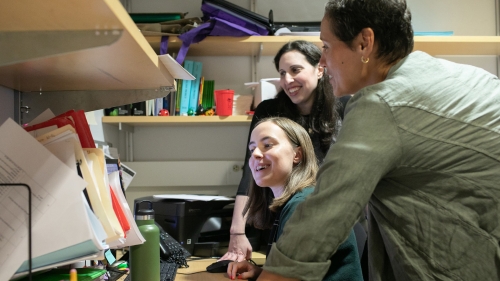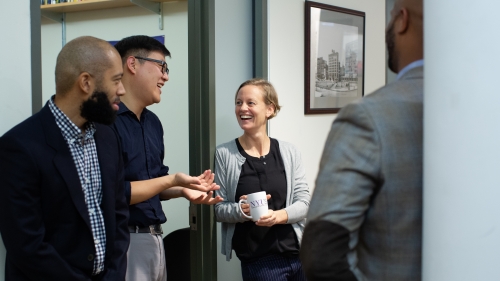

Rezarta Bilali
Associate Professor of Psychology and Social Intervention
Applied Psychology
Rezarta Bilali is Associate Professor of Psychology and Social Intervention at New York University. Before joining NYU, she worked as Assistant Professor of Conflict Resolution at the University of Massachusetts, Boston. Bilali holds a PhD in Social Psychology with a concentration in peace and violence from the University of Massachusetts, Amherst. Bilali's research focuses on (1) the role of social psychological factors underlying mass violence; (2) the role of historical narratives in collective action for social change, and (3) development and evaluation of interventions to promote intergroup reconciliation, with a focus on narrative interventions via media. Dr. Bilali employs multiple methodologies in her research, including field and lab experiments, surveys, and interview studies. She has conducted research in different parts of the world including Albania, Burundi, Burkina Faso, Democratic Republic of Congo, Rwanda, Turkey, the United States, etc. Her research has been funded by numerous foundations, including Spencer Foundation, Russell Sage Foundation, USAID, American Psychological Foundation, Psychology Beyond Borders, etc. Dr. Bilali has over 15 years of experience collaborating with non-governmental organizations to develop and evaluate violence prevention and reconciliation media programs. She has published 50 peer-reviewed articles and book chapters, as well as written a dozen technical reports for various collaborating organizations.
Selected Publications
- Bilali, R. (2025). The need for context in intergroup conflict research. Nature Reviews Psychology.
- Bilali, R., Freel, S.*, & Varela, M.* (2024). Narratives of Success and Failure of Past Collective Action Influence Intentions to Engage in Future Action: The Case of the 2017 Women's March Psychology of Women Quarterly. https://doi.org/10.1177/03616843241286811
- Penic, S., Elcheroch, G., & Bilali, R. (2024). Knowledge about diverse conflict experiences and community cohesion: The role of shareability of diverse conflict experiences. European Journal of Social Psychology. https://doi.org/10.1002/ejsp.3129
- Bilali, R. (2024). Narrative interventions in conflict settings: Harnessing the power of narratives to prevent violence and promote peace. European Review of Social Psychology. https://doi.org/10.1080/10463283.2024.2397307
- Bilali, R. (2024). Media narrative interventions influence efficacy beliefs to impact social change, social norms, and behavioral choices: A field experiment in Burkina Faso. Group Processes and Intergroup Relations. https://doi.org/10.1177/13684302231186243
- Bilali, R. (2022). Fighting violent extremism with narrative intervention. Evidence from a field experiment in West Africa. Psychological Science, 33(2), 184-195. https://doi.org/10.1177%2F09567976211031895
- Storz, N.*, Bilali, R., Martinovic, B., Maloku, E., Rosler, N., & Žežel,j I. (2022). Collective victimhood and support for joint political decision-making in conflict regions: The role of shared territorial ownership perceptions. European Journal of Social Psychology, 52, 472-486. https://doi.org/10.1002/ejsp.2831
- Freel, S.H.*, & Bilali, R. (2022). Putting the past into action: How historical narratives shape collective action participation. European Journal of Social Psychology, 52(1), 204-222. https://doi.org/10.1002/ejsp.2813
- Ulug, M., Bilali, R., Karasu, M., & Malo, L. (2021). Obstacles to reconciliation and forgiveness among victim groups of unacknowledged past trauma and genocide. European Journal of Social Psychology, 2, 313-325. https://doi.org/10.1002/ejsp.2740
- Freel, S.H.*, Bilali, R., & Godfrey, E. B. (2021). ‘We are the Resistance’: Predictors and consequences of self-categorization into the emerging movement to oppose Trump. Group Processes and Intergroup Relations. https://doi.org/10.1177/1368430220974758
- Bilali, R., Godfrey, E. B., & Freel, S. H. (2020). How an election loss leads to a social movement: Reactions to the 2016 U.S. presidential election among liberals predict later collective action and social movement identification. British Journal of Social Psychology, 59(1), 227-247. https://doi.org/10.1111/bjso.12335
- Bilali, R., Iqbal, Y.*, & Freel, S. (2020). Understanding and counteracting genocide denial. In L. S. Newman (Ed.). Confronting humanity at its worst: Social psychological perspectives on genocide (pp. 284-311). Oxford University Press.
- Bilali, R., Iqbal, Y.*, & Erisen, C. (2019). The role of lay beliefs about group-based transgressions in acknowledgment of responsibility for ingroup harm-doing. European Journal of Social Psychology, 49(5), 992-1006. https://doi.org/10.1002/ejsp.2583
- Bilali, R., & Vollhardt, J. R. (2019). Victim and perpetrator groups’ divergent perspectives on collective violence: Implications for attitudes toward political issues and intergroup relations. Advances in Political Psychology, 40(1), 75-108. https://doi.org/10.1111/pops.12570
- Bilali, R., Iqbal, Y., & Celik, A. B. (2018). The role of national identity, religious identity and intergroup contact on social exclusion across multiple social divides in Turkey. International Journal of Intercultural Relations, 65, 73-85. https://doi.org/10.1016/j.ijintrel.2018.04.007
- Bilali, R., Vollhardt, J. R., & Rarick, J. D. R. (2017). Modeling collective action through media to promote social change and positive intergroup relations in violent conflicts. Journal of Experimental Social Psychology, 68, 200-211. https://doi.org/10.1016/j.jesp.2016.07.005
- Bilali, R., & Vollhardt, J. R. (2015). Do mass media interventions effectively promote peace in contexts of ongoing violence? Evidence from Eastern Democratic Republic of Congo. Peace & Conflict. Journal of Peace Psychology, 21, 604-620. https://psycnet.apa.org/doi/10.1037/pac0000124
- Vollhardt, J. R., & Bilali, R. (2015). The role of inclusive and exclusive victim consciousness in predicting intergroup attitudes: Findings from Rwanda, Burundi, and DRC. Political Psychology, 36, 489-506. https://psycnet.apa.org/doi/10.1111/pops.12174
- Bilali, R., & Vollhardt, J. R. (2013). Priming effects of a reconciliation radio drama on historical perspective-taking in the aftermath of mass violence in Rwanda. Journal of Experimental Social Psychology, 49, 144-151. https://psycnet.apa.org/doi/10.1016/j.jesp.2012.08.011
- Bilali, R. (2013). National narrative and social psychological influences in Turks’ denial of the mass killings of Armenians as genocide. Journal of Social Issues, 69, 16-33. https://psycnet.apa.org/doi/10.1111/josi.12001


